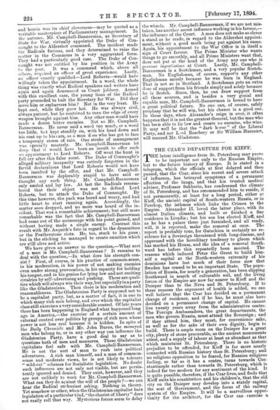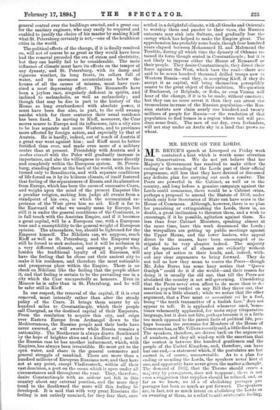THE CZAR'S DEPARTURE FOR KIEFF. T HE latest intelligence from St.
Petersburg may prove to be important not only to the Russian Empire, but to the future history of Europe. It is stated in a telegram, which the officials at first delayed and then passed, that the Czar, since his recent and severe attack of influenza, has betrayed symptoms of a permanent affection of the lungs, and that his trusted medical adviser, Professor Sakharin, has condemned the climate of St. Petersburg, and has recommended him to reside, if not permanently, at least for a long period, either at Kieff, the ancient capital of South-western Russia, or in Perekop, the isthmus which links the Crimea to the Empire. Alexander II. loved. the latter place, with its almost Italian climate, and built or finished a fine residence in Livadia ; but his son has elected Kieff, and as he has a palace there just furnished, and all ready, will, it is reported, make the removal at once. The report is probably true, for Gatschina is certainly no re- sidence for a Sovereign threatened. with lung-disease, and oppressed with the hereditary tendency to gloom which has marked his House, and the idea of a removal South- ward has before this repeatedly been mooted. The reasons which induced. Peter the Great to build him- self a capital at the North-western extremity of his dominions have lost much of their force now that Sweden has ceased to be an important State. The popu- lation of Russia, for nearly a generation, has been slipping Southward in search of culturable soil, and the living forces of the Empire are now far nearer to Kieff and the Dnieper than to the Neva and St. Petersburg. If to these reasons the argument of health is added, we can well believe that the Czar has decided on a permanent change of residence, and if he has, he must also have decided on a permanent change of capital. He cannot live twenty years away from the administrative centre. The Foreign Ambassadors, the great departments, the men who govern Russia, must attend the Sovereign ; and if they attend. him, they must, for convenience sake, as well as for the sake of their own dignity, begin to build. There is ample room on the Dnieper for a great city, plenty of stone procurable, as the ancient monuments attest, and a supply of labour at least as abundant as that which maintains St. Petersburg. There is no historic prejudice to be offended, for Kieff is far more nearly connected with Russian history than St. Petersburg ; and. no religious opposition to be feared, for Russian religious feeling, so far as it has a centre, turns towards Con- stantinople rather than towards St. Petersburg, which is indeed far too modern for any sentiment of the kind. It is quite possible, therefore, if the Czar lives, and finds that Kieft suits his constitution and his children's, that the old city on the Dnieper may develop into a stately capital, the seat of Government, and the focus of the railway system of the Empire. It will be a marvellous oppor- tunity for the architect, for the Czar can exercise a general control over the buildings erected, and a great one for the sanitary engineer, who may easily be required and enabled to justify the choice of his master by making Kieff what St. Petersburg certainly is not,—one of the healthiest cities in the world.
The political effects of the change, if it is finally resolved on, will not of course be as great as they would have been had the removal preceded the era of steam and electricity, but they can hardly fail to be considerable. The mere influence of climate must have its effects on the temper of any dynasty, and St. Petersburg, with its damp and. rigorous weather, its long frosts, its cellars full of water, and its enormous accumulations below the houses of all the causes of miasma, must have exer- cised a most depressing effect. The Romanoffs have been a joyless race, singularly deficient in spirits, and inclined to melancholia, as well as melancholy ; and though that may be due in part to the history of the House so long overburdened with absolute power, it must have been due also, in part, to the cold swamp amidst which for three centuries their usual residence has been fixed. In moving to Kieff, moreover, the Czar moves nearer to Europe and its influences, into a city sure to be less separate and more Western, and to provinces more affected by foreign action, and especially by that of Austria. He is hardly, indeed, out of reach of Austria if a great war went against him ; and. Kieff must be better fortified than ever, and made even more of a military centre than at present. Friendship with Austria and a modus vivendi with the Poles will gradually increase in importance, and also the willingness to come more directly and completely within the European system. St. Peters- burg, standing there at the back of the world, with its face turned only to Scandinavia, and with separate conditions of life forced on it by its hideous climate, of itself fostered that feeling of the separateness of Russia and its alienation from Europe, which has been the curse of successive Czars, and weighs upon the mind of the present Emperor like a peculiar religion, making him judge all events from a standpoint of his own, in which the accumulated ex- perience of the West gives him no aid. Kieff is far to the Eastward of what we usually mean by Europe, but still it is under the general conditions of the Continent, is in full touch with the Austrian Empire, and if it becomes a great capital, will be a European one, with a European tone and a susceptibility to the general weight of European opinion. The atmosphere, too, should be lightened for the Emperor himself. The Nihilists can, we suppose, reach Kieff as well as St. Petersburg, and the Emperor may still be forced to seek seclusion, but it will be seclusion in a very different climate, and amongst a people who, besides the traditional loyalty of all Russians, will have the feeling that he chose out their ancient city to make it his residence, and therefore the most noticeable and prosperous place within the Empire. There is no check on Nihilism like the feeling that the people abhor it, and that feeling is certain to be the prevailing one in a city which the Czar unexpectedly so honours. Even in Moscow he is safer than in St. Petersburg, and he will be safer still in Kieff.
In one respect, the removal of the capital, if it is ever removed, must intensify rather than alter the steady policy of the Czars. It brings them nearer by six hundred miles to Constantinople, which their people call Czargrad, as the destined capital of their Emperors. From the resolution to acquire this city, and reign over Eastern Europe .from Archangel down to the Mediterranean, the Russian people and their lords have never swerved, or will swerve while Russia remains a ,nationality. The Northerner is always drawn Southward oy the hope of brighter skies and a kindlier soil ; and in the Russian case he has another inducement, which, with Empires, has always been irresistible. He must get to the open water, and share in the general commerce and general struggle of mankind. There are more than a hundred millions of European Russians now, and they have not at any point, except Vladivostock, within all their vast dominion, a port on the ocean which is open under all circumstances and throughout the year. They, therefore, desire Constantinople with an ardour not felt in this country about any external position, and the more they trend to the Southward the more will this feeling be developed. It is said that with very great Russians the feeling is not entirely unmixed, for they fear that, once settled in a delightful climate, with all Greeks and Orientals to worship them and pander to their vices, the Russian autocrats may sink into Sultans, and gradually lose the energy which has helped to make the Empire great. The apprehension has probably some basis, though four hundred years elapsed between Mohammed II. and Mahmoud the Terrible, during all which time the dynasty of Othman re- tained its force though seated in Constantinople ; but it is not likely to impress either the House of Romanoff or their people. They desire Constantinople, they direct their force against the West, which bars the road—there are said to be seven hundred thousand drilled troops now in Western Russia—and they, in accepting Kieff, if they do accept it as capital, will bring themselves perceptibly nearer to the great object of their ambition. We question if Bucharest, or Belgrade, or Sofia, or even Vienna will hear of the change, if it is to be made, without emotion ; but they can no more arrest it than they can arrest the tremendous increase of the Russian population—the Rus- sian statists now claim nearly one hundred and twenty millions of people for Russia—or the resolution of that population to find homes in a region where toil will pro- duce some fruit. The men of our day, even Icelanders, will not stay under an Arctic sky in a land that grows no wheat.







































 Previous page
Previous page